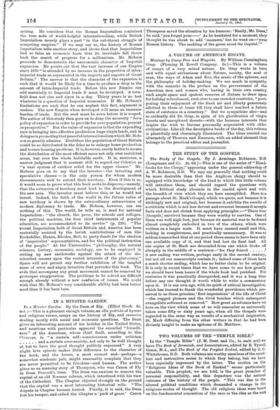THE STUDY OF THE GOSPELS.
The Study of the Gospels. By J. Armitage Robinson,- D.D (Longmans and Co. 2s. 6d.)—This is one of the series of " Hand- books for the Clergy," appearing under the general editorship of A. W. Robinson, B.D. We may say generally that nothing could be more desirable than that the Anglican clergy should be equipped with knowledge of the kind to which this little volume will introduce them, and should regard the questions with which Biblical study abounds in the candid spirit and with the breadth of view which they see here exemplified. Here is a passage about St. Mark's Gospel, which we quote, not because it is strikingly new and original, but because it exhibits the results of a criticism which is not less devout and reverent because it accepts facts and does not shrink from applying principles :--" These four [Gospels] survived because they were worthy to survive. One of them was well nigh lost, just because its material was to be found almost completely embodied in two of the others, which were written on a larger scale. It must have seemed small and thin, lacking in completeness, and practically unnecessary. It was so seldom transcribed that at one period there seems to have been only one available copy of it, and that had lost its final leaf. All our copies of St. Mark are descended from one which broke off abruptly in the middle of a sentence= for they feared A new ending was written, perhaps early in the second century, but not all our manuscripts contain it; indeed some of them have a much shorter ending, which has no better claim to be original. It is only in recent times that we have come to see how greatly we should have been losers if the whole book had perished. For centuries it was practically disregarded, and it was a long time before any one thought it worth while to write a commentary upon it. It is our own age, with its spirit of critical investigation, which has learned to thank the wonderful providence which pre- served to us these priceless 'first impressions' of the life of Christ —the rugged phrases and the vivid touches which subsequent evangelists softened or removed." How great an advance have we here on the view which some of us will remember as universally taken some fifty or sixty years ago, when all the Gospels were regarded in the same way as results of a mechanical inspiration, St. Mark differing from the other writers in that he had been divinely taught to make an epitome of St. Matthew.






















































 Previous page
Previous page